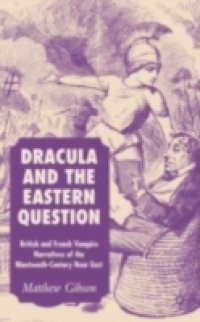Although politically oriented critiques of vampire narratives have tended to treat them either as displaced discussions of the Irish Question or in terms of late imperial anxieties, few have as yet centred on the Near Eastern settings of many of these works to see them as engaging with the politics of that region. In this work Matthew Gibson eschews the achronic binaries of scholars like Edward Said and places the oeuvres of Polidori, Le Fanu, Stoker, Prosper Merimee and Jules Verne against the immediate and specific contexts in which the books were written, to argue that they are in fact concealed allegories of the right response to the Eastern Question - namely, what to do with the Balkan lands once the Ottoman Empire finally fell. Aboveall, they are allegories that contradict the Liberal conformism of the surface narration, relating ideas the authors would rather suggest than openly avow. Gibson's study provides a new perspective on several major Gothic works (including, Carmilla, Dracula and The Lady of the Shroud) and will be of interest to all those working in the field of Gothic Studies.

